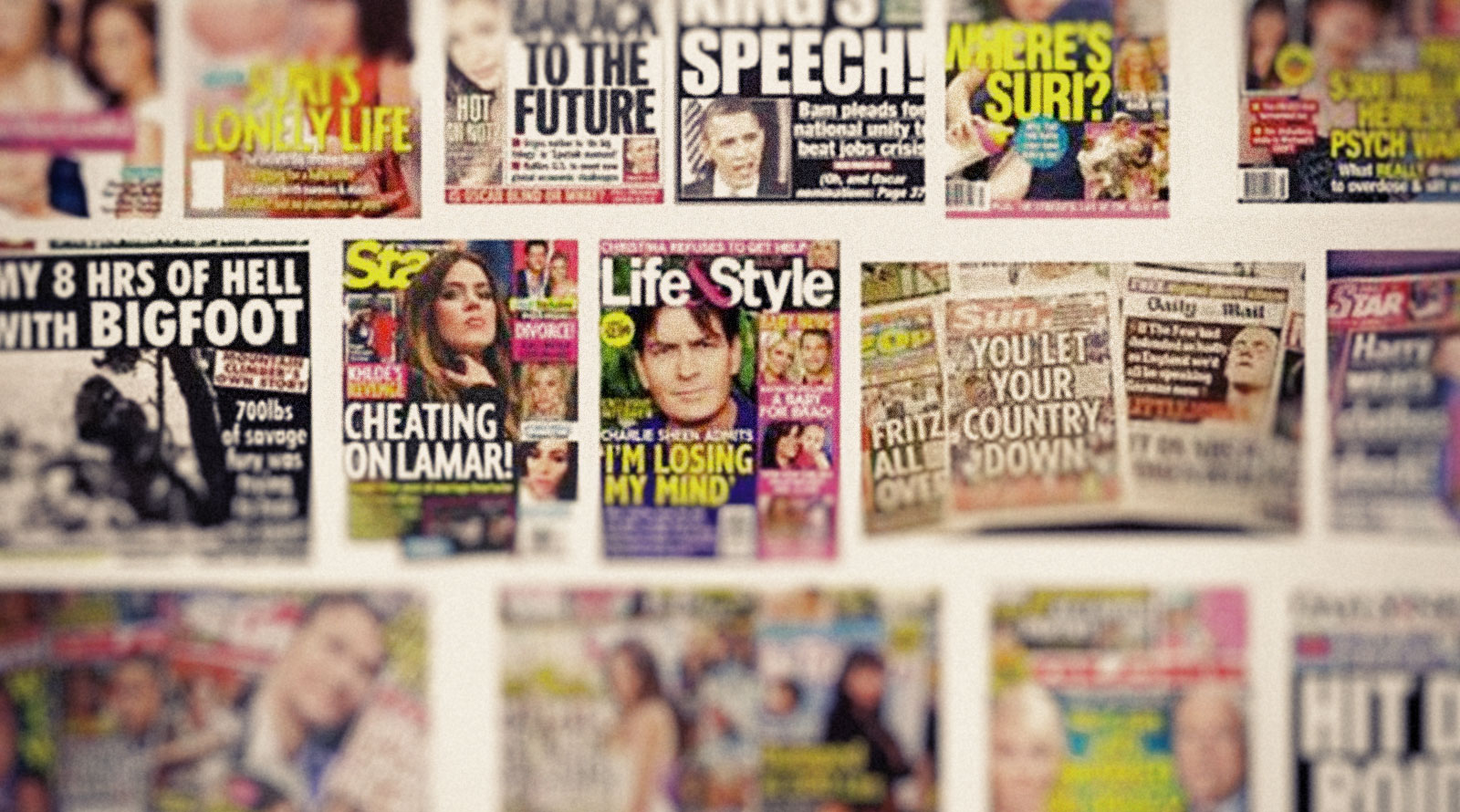What is the celebrity uncertainty principle?

[My friend Peter Sheridan is a Los Angeles-based correspondent for British national newspapers. He has covered revolutions, civil wars, riots, wildfires, and Hollywood celebrity misdeeds for longer than he cares to remember. As part of his job, he must read all the weekly tabloids. For the past couple of years, he's been posting terrific weekly tabloid recaps on Facebook and has graciously given us permission to run them on Boing Boing. Enjoy! - Mark]
If Werner Heisenberg were still alive, at 114 years old, by now the German physicist would surely have developed his celebrity uncertainty principle.
Put simply, a celebrity cannot be observed and accurately reported simultaneously. The act of observing a celebrity makes accuracy impossible, and conversely getting to the truth of a celebrity makes observation impossible, most likely because they're locked behind closed doors.
This week's peer-reviewed scientific journals known as the supermarket tabloids and celebrity magazines ably demonstrate Heisenberg's celebrity uncertainty principle in action.The stars are just like us, proclaims Us magazine: they ride bikes, go shopping and eat snacks at L.A. Clipper games (though I can't remember the last time I had courtside seats, to be honest.). But the act of observation has changed these celebrities: they have dressed with care, brushed their hair, and take each step in public knowing that they may be stalked by paparazzi. Actress Minka Kelly, seen walking her dogs in Us mag, has donned her tightest body-hugging leggings and hidden her eyes behind sunglasses knowing that photographers lurk.
When Taylor Swift tells Us mag "25 things you don't know about me" spread over two vacuous pages, revealing that she kept hermit crabs as childhood pets, has double-jointed elbows and can't spin cartwheels, she exposes nothing of herself, aware that she is under observation.
Only if she was not being observed could she be close to her real self. Actress Angela Bassett exposes the contents of her handbag for inspection by Us mag's crack investigative team of reporters, revealing that she carries honey roasted almonds, lipstick and keys. But why do we never see Xanax and Valium, a rolled joint, baggie of cocaine, birth control pills or condoms in any celebrity handbag? Because Heisenberg's celebrity uncertainty principle states that the more closely you observe a celebrity, the less accurate the image becomes, and the stars's publicists have purged their purses for public viewing.
The tabloids offer the other side of this principle by looking with microscopic intensity at celebrity lives, and in doing so lose all sense of accuracy.
"Humiliated Queen Gets Proof Uncle Was Jack The Ripper!" screams the Globe. It's a story filled with details, but the closer it gets to its subject, the less accurate it becomes. "Uncle Albert" was actually her great-uncle: her father King George VI's uncle. Two handwritten letters by Albert supposedly reveal that he spoke of symptoms similar to a venereal disease, which more than 40 years ago was posited as a theory to explain why a syphilitic Prince could have been the Ripper. Only one small problem: Royal records of 1888 prove that Albert was not in London when the Ripper's murders were committed.
"Old man" George Clooney "Quits Hollywood" proclaims the Globe, reporting that the 54-year-old actor is abandoning acting after Hail, Caesar and Tomorrowland were box office flops, adding that "he hasn't had a big hit in 16 years, with the exception of the Ocean's Eleven films.' That's a pretty big exception. And what about 2009's acclaimed Up In The Air? Or Oscar winning 2013 drama Gravity? Or the fact that he recently finished filming Money Monster opposite Julia Roberts, has Suburbicon in pre-production, and 15 more films in the pipeline? Clooney would as soon quit Hollywood as Heisenberg would abandon wave particle duality.
"Madonna To Adopt As Son Rocco Snubs Her," claims the National Enquirer. Because the singer allegedly visited an orphanage when on tour in the Philippines - and therefore had to be shopping for a new child. If parents adopted a new child every time their teenager screamed "I hate you," the world's orphanages would be empty.
"Oscar parties were fueled by drugs," states the Enquirer, which employed scientific tests - and science never lies! - to find "traces of narcotics" in bathrooms, handrails and bar tops "all around Hollywood" at venues where the stars partied. How significant is that?
Heisenberg's celebrity uncertainty principle demonstrates that it's almost meaningless. After all, a 2009 study found that 90 per cent of paper money in the U.S. contains traces of cocaine. Researchers in 2011 found that 92 per cent of baby changing tables studied in the U.K. carried cocaine traces. Cocaine traces were found in nine toilets in Britain's Houses of Parliament in 2013, and in London's St Paul's Cathedral last December. Traces of cocaine in Hollywood? I'm shocked. Shocked, I tell you.. I'm not saying that Hollywood celebrated the Academy Awards abstemiously, but those cocaine traces could have been there for months, even years. It's just another story high on detail, low on accuracy, as Heisenberg would have predicted.
Fortunately we have Us magazine to bring us the week's hard-hitting news: Kate Upton and Alessandra Ambrosio wore it best, Margot Robbie mistook Prince Harry for Ed Sheeran (an easy error to make, except that Sheehan has talent and earned his fame), and Chrissy Teigen's hair gets "megavolume - without mousse" thanks to a product it turns out she's paid to hawk.
Leave it to the Examiner to report on the "mysterious music in space" heard by Apollo astronauts - a story widely reported by mainstream media in the past week, despite the fact that the story has been around for years, and the "music" - an eerie whistling sound - was long ago explained as interference between the VHF radios on the command module and lunar module. But why let facts get in the way of a good story? Werner Heisenberg would be proud.
Onwards and downwards . . .